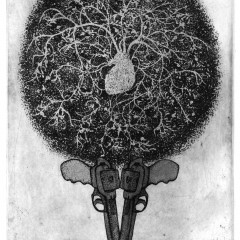Post from Dennis Meredith
[I got this email from our friends Dennis and Joni, who retired to their cabin in the woods of North Carolina just a week ago. — Libby]
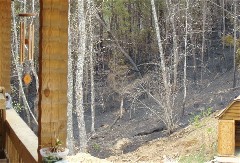
Fire damage, viewed from the cabin
Murr, Libby,
Thought you’d be interested in this account of our harrowing first week in the cabin:
We’d moved into the cabin Tuesday, April 11. All our worldly possessions were crammed into the existing structure, while around us workmen hammered and sawed away putting on a new addition to give us more room. On Wednesday afternoon, Joni went out for a routine golf cart ride around Chinquapin, the 300-acres that surround our ten-acre plot. She came bursting back into the cabin to call 911, saying she’d seen the beginning of a forest fire — an alarming event, given that we’d had no rain for weeks, and loggers working in the area had left dense piles of dry brush.
We evacuated immediately to the Christmas tree farm on the main road, and within minutes a Forestry Service truck came careening up the road and into Chinquapin. Soon followed half-a-dozen fire trucks and a trailer truck hauling a bulldozer. A spotter plane arrived to circle overhead. Many neighbors showed up to offer us help, to gossip, and to tell stories of other fires that had swept through the area over the decades.
Since the cabin wasn’t threatened, and darkness was falling, we retreated to a motel in Wilkesboro. The next morning, we arrived back to find the fire under control. The firemen had contained it on three sides within roads, and on a fourth the bulldozer had cut a firebreak through the woods. About 10 acres had burned.
We patrolled the area over the next day, and watched the remaining smoking embers die out. We thought it was all over.
Fire Number 2
Then on Friday, the forest ranger called, warning us to get out immediately; that smoke had been reported rising from the area. We grabbed whatever essentials we could and took off at high speed over the gravel road leading out. We drove into dense smoke, and as we neared the entrance to Chinquapin, flames were rising on both sides of the road. I was vaguely aware of a truck parked beside the road, and Joni saw a man walking up from an area where the fire was burning. We assumed he was a forest ranger.
This time the fire was far more serious. It had jumped the road and the firebreak; a dry wind had begun to gust; and nothing stood between the fire and our cabin. We stopped out by the main road to wait. Fire trucks began to arrive again, but ominously this time they all stopped there. The firefighters had to develop a strategy for a fire that was out of control in extremely dangerous dry, windy conditions. The trucks showed the names of many towns from miles around, so this was a fire that required marshalling everybody available. We heard that the rangers were evacuating several nearby developments.
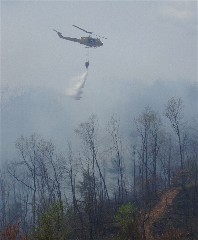
A bright yellow water bomber flew over and dropped the first of what would be many loads of water skimmed from a nearby lake
A 30-minute window
The lead Forestry Service ranger gravely warned us that they had about 20 to 30 minutes until the flames reached the cabin. They weren’t sure they could save it. Shortly, though, the bulldozer backed off its trailer and began moving off into the smoke. The firefighter was going to drive it right down the road that by this time was probably blazing on both sides. The spotter plane arrived and began circling.
Still another hot spot
Smoke abruptly began to rise from an entirely different area, and we were told that a second fire had sprung up. A bright yellow water bomber flew over and dropped the first of what would be many loads of water skimmed from a nearby lake.
The “stager,” a very nice lady named Sissy — who brought her charming young daughter Savannah to help her — said she’d be happy to answer any questions and help us in any way she could. She also asked us to move back to a nearby church, since there would soon be a great many trucks and firefighters arriving. She said “Now, I have to warn you there will be all kinds of commotion in a minute, with all kinds of folks coming in and hollering at each other. But that’s normal. Just don’t let it worry you.”
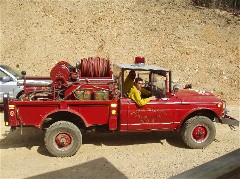
An old firetruck to the rescue.
Indeed, volunteer firefighters, men and women, began arriving in pickups and pulling on yellow coveralls and donning hardhats. The lead Forestry Service ranger called a safety meeting. As they gathered around him, one firefighter cracked “Yeah, if you want to be safe, don’t go in.” The ranger told the men and women to be prepared to move quickly; not to pay out so much hose they couldn’t leave in a second. Whipped by the wind, the fire was moving very fast and burning very hot.
Joni commented that it felt so surreal, sitting on a blanket among Christmas trees, beneath a beautiful old oak, butterflies flitting about us, and watching people going to risk their lives to stop a massive, uncontrolled fire.
A night of worry
Since it was growing dark, we decided we couldn’t learn any more by staying, so we went to a motel. For the sake of our nerves, it’s a good thing we did. A friend whose house overlooks the area said the flames lit up the night sky. All that evening in the motel, we pondered what we would do if we went back to find our cabin and possessions a smoldering ruin.
The next morning, having slept very little, we drove back. The lead Forestry Service ranger approached us. He smiled. He first apologized that the bulldozer had ruined the plantings around the cabin. I said we had absolutely no problem with that; I considered it free landscaping. Then he told us they had saved the cabin. Joni hugged the nearest firefighter.
The ranger said we could go in for a while, but although the fires had burned past the cabin, they were moving up the ridge across from us. So he wasn’t quite sure it was safe. We followed a Forestry Service truck in, past acres of charred, smoking land. The masses of brush and grass were now reduced to ash.
We reached the cabin to find it intact but encircled by a wide gash of bare dirt where the bulldozer had cut a firebreak, clearing away all the bushes and all but the largest trees.
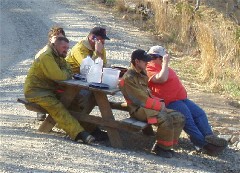
The fire heroes
Two small tanker trucks were parked beside it, and slumped on our picnic table were the soot-covered firefighters who had kept the fire from the cabin all night. It had come within 50 feet of the cabin. No doubt the flames on the hill overlooking the cabin had been huge, since the area was piled with dry brush from our logging.
The ranger told us the firefighters had only been able to stay to fight the fire because we had cleared the entire hill above the cabin except for a few hardwoods. Without a safe haven on the hill, the firefighters would have had to leave as the flames approached, and the cabin would have been lost.
Arson
He also told us that both fires — the first one and the massive second one — had been deliberately set. We realized that we had probably driven right past the arsonist on our second evacuation, since he couldn’t have been a forest ranger; they had just received the alarm. Joni got the best look at him since I was driving, and she describes him as completely nondescript — neither tall nor short, fat nor thin, young nor old. The ranger told us they will not likely catch him, since he must be seen in the act of setting the fire to be arrested and charged.
We thanked the firefighters profusely and cooked them a hot breakfast. I told them they were heroes, but they modestly mumbled something about “just doing their job.” In fact, that was the response we invariably got from the firefighters when we thanked them all. Joni made it a particular point to holler out “Thank you!” anytime we passed a group.
Since the land around us had already burned out, the team that had saved the cabin moved on, leaving a spotter to make sure the fire didn’t double back to ignite the unburned brush below the cabin. The forest ranger told Joni we could stay with the permission of the “incident commander.” She rode out to the staging area to ask him, and to tell him we’d likely seen the arsonist.
We settled in for the rest of the day to watch the smoke rise from fires on the next ridge and a helicopter water-bomb the hot spots. We had electricity but no phone, because the fire had melted the junction box. Since the cabin had been closed when the fire burned past it, we could detect only a slight, lingering smoky smell inside.
We watched firefighters on the other ridge work to save two houses there. We also heard them on the hill above us, as they worked to save our barn from a fire that burned out large piles of brush and trees on the other side of the hill.
They were apparently winning that battle and in good spirits, because we heard them playing with the loudspeaker. One firefighter tested it as the world’s loudest turkey call, issuing loud gobble-gobbles that echoed across the valley. I could not identify other noises I heard over the loudspeaker.
The cabin also gained a bit of media attention. It was a backdrop for a segment for the local TV news, and a photo of the cabin with burning brush in the foreground ran in the Winston-Salem Journal.
Despite the fact that the area had largely burned out, a firefighter patrolled Chinquapin all night on a four-wheeler to watch for flareups. And all Easter Sunday, trucks equipped with firefighters and equipment passed the cabin on search-and-destroy missions for remaining hotspots.
Log cabin, graves rescued
When we toured Chinquapin, we discovered that the firefighters had made a stand at its century-old log cabin and had saved it. The fire had burned right up to the road that runs past it, but they’d stopped the fire from jumping to the cabin. The two small gravestones nearby that mark the resting place of children who died in 1918 — one of influenza and one of pneumonia — were also untouched.
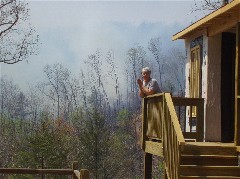
View from the porch (that’s Joni)
There is no longer any smoke; only a vast acreage of charred forest and a slight smell of charred wood. Fortunately, the fire had remained a ground fire, rather than a “crown” fire that destroys trees. In fact, the trees have begun to leaf out normally.
While the area looks bleak now, we’re told that, in fact, the fire will benefit the forest, rapidly returning nutrients to the soil and killing off pests. And within a growing season or two, there will be little evidence of the fire, except for some charred logs.
The wildlife is quite adept at avoiding fire, and there was only one report of a dead deer. We saw a very handsome male quail inspecting the unburned brush pile below the cabin, where he’ll no doubt establish a covey. And on one trip to inspect damage, we saw a blacksnake slither across the road and into the ash, having avoided the fire and now looking for an unburned refuge. The large dogwoods by our stream were spared and are in full bloom.
The statistics
In the end, about 430 acres burned, no houses were lost, and none of the 180 firefighters were injured.
This story came to a fitting end for me just as I took a break from finishing writing it. I walked out on the porch to see a smoking ember flame up in the woods above the cabin. It had been fanned by a wind that turned out to be the beginning of a thunderstorm. I stood and watched with considerable satisfaction as the rain drowned that last fire.
I’ve attached some photos of the firefighters and the fire, showing how close it came to the cabin.
I wonder what our second week in the cabin will bring.
Dennis
–Posted by Dennis Meredith





